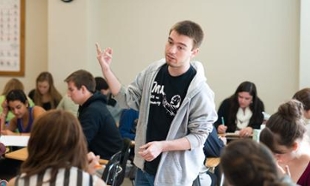JMU gets $300,000 grant to address need for more physics teachers
News
JMU graduates about 17 physics majors each year, one of the largest undergraduate-only programs in the country. But in the past eight years, only one of those physics graduates has gone on to teach high school physics.
Backed by a $300,000 grant from the Physics Teacher Education Coalition, Brian Utter, an associate professor of physics, and several of his colleagues, are looking for a few more physics majors with an interest in teaching. The jobs are out there for those who choose that path.
"There's a huge shortage of physics teachers," Utter said. "Your child takes physics in high school and you ask what's the chance that person has a major or even a minor in physics and it's less than 40 percent."
The three-year grant is funding a teacher in residence position, filled by someone who has taught high school physics and can mentor undergraduates interested in teaching, as well as stipends for students who work as learning assistants. To become a learning assistant, a student has to do well in an introductory physics course and also take a two-credit physics pedagogy course. Learning assistants get a taste of teaching while helping their peers.
"They're kind of floating around the class helping to sort of spur on the conversation and, when people get to a dead end, to redirect them a little bit," Utter said. "The idea is, we have a way to get students involved in something that looks like teaching early."
The learning assistants also get to experience planning a lesson and teaching high school students when they take the two-credit pedagogy course.
The learning assistant program "seemed to be a perfect way to find out if teaching was really the career I wanted to pursue," said Nick Hagans, a senior who is working his fifth semester as an LA this fall.
Joe Mahler, this year's teacher-in-residence, said he couldn't pass up the opportunity to mentor future teachers after teaching high school physics for 12 years at St. Catherine's School in Richmond. "I just left the classroom, so everything's fresh in my mind. It will be nice for them to have a fresh set of eyes that can help coach them along," he said.
In addition to mentoring the learning assistants, Mahler will be instrumental in holding professional development workshops for current physics teachers from around the state. "I've really become interested in working with teachers, which is one of the components of the teacher-in-residence, doing outreach and helping teachers that need help," said Mahler, who learned about the TIR program through his involvement with JMU's summer Content Teaching Academy.
Mahler said he uses a "modeling" style of teaching, where students learn by doing what scientists do. "So you study a system, you look at something like a toy car rolling down a ramp, and what you're doing is you're teaching the students how to observe a system and figure out what they can measure about the system, then collect data, then use that data to make a model. We make a model of how we think it works and then we use that model to make predictions. And the students come up with the laws of physics on their own."
One of the most important aspects of the PhysTEC program is making sure students who might have an interest in teaching physics know there is a path to get there, said Utter, who serves as the secondary education minor advisor in the physics department.
Having just a few physics majors each year go into teaching would make a significant impact, Utter said. "I think the number of people who got licensure to teach physics last year was about 30, but they're not all physics majors, it's anybody who might have a secondary licensure. I think the number of physics students, from all Virginia colleges, who got licenses was something like seven. So if we could produce a few a year, then we're doing something pretty important on that scale."
By Eric Gorton ('86, '09M) and Melissa Mowery ('14)

